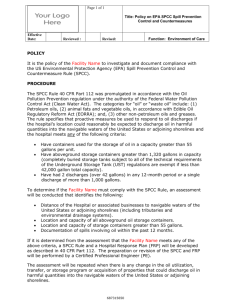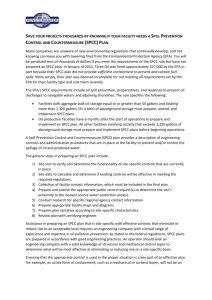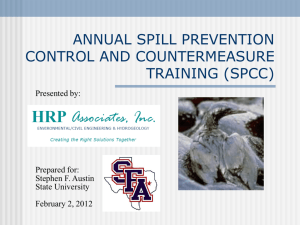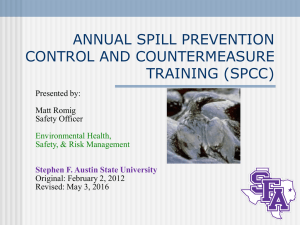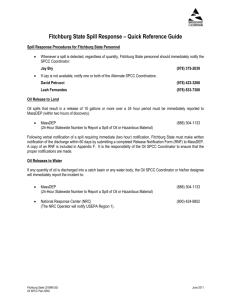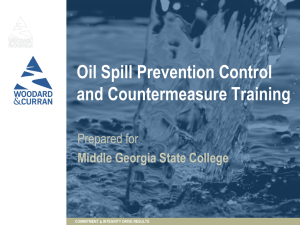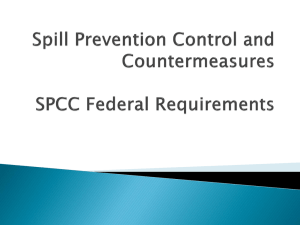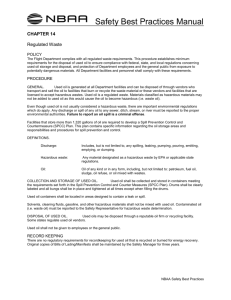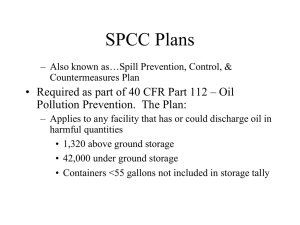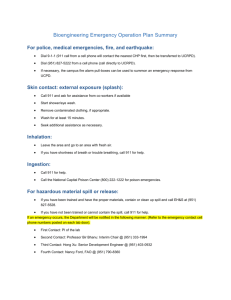Macon Campus Oil SPCC Plan - Middle Georgia State University
advertisement
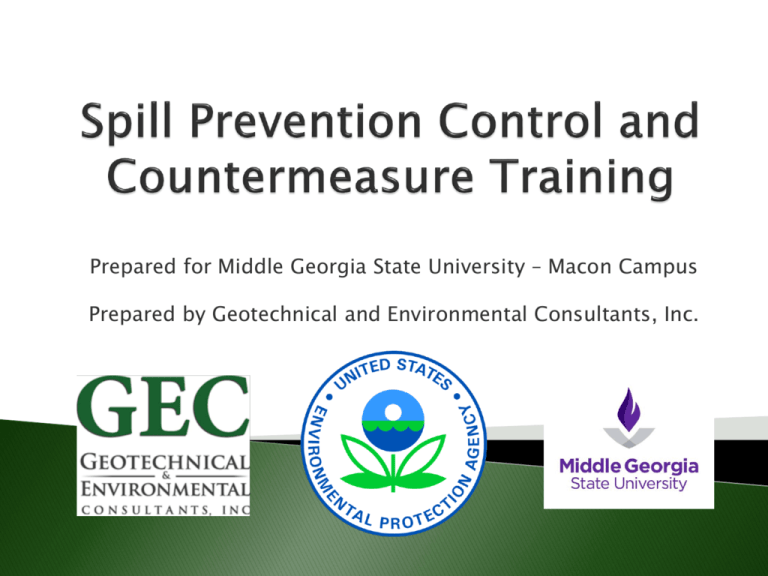
Prepared for Middle Georgia State University – Macon Campus Prepared by Geotechnical and Environmental Consultants, Inc. Spill Prevention Control and Countermeasures The EPA passed the oil pollution prevention regulation (40 CFR 112) promulgated under the authority of the Clean Water Act (33 USC 1251) The SPCC establishes preventative measures to halt the discharge of oil into waters of the United States. The facility address is: 100 University Parkway Macon, Georgia 31206 The facility location is: The north side of Eisenhower Parkway, south of Columbus Road, east of Ivey Drive and and west of Interstate 475. Surface water from the site drains into Knee Deep Pond which is located on-site. Facility Contacts Assistant Director, Plant Operations (478)–471-2855 Director, Plant Operations (478)-471-2782 Secretary Office, Plant Operations (8AM-5PM - Contact if Assistant Director and Director aren’t available) (478)-471-2780 Middle Georgia State University Police (After Hours Contact) (478)-471-2414 Above Ground Oil Storage (Diesel Fuel, Gasoline, Used Oil, Mineral Oil) – 5238 gallons Underground Oil Storage (Grease Traps) – 4232 gallons Familiarize employees with the written SPCC Plan Provide proper training to all oil-handling employees To better able employees to identify potential pollution sources and identify pollution prevention techniques Facilities that store, transfer, consume, or otherwise use oil “due to its location, could reasonably be expected to discharge into or upon waters of the United States.” Under the SPCC regulations, oil is defined as “oil of any kind or in any form including, but not limited to, petroleum, fuel, sludge, oil refuse, and oil mixed with wastes other than dredges spoil and oily mixtures.” This also includes non-petroleum oils, animal and vegetable oils. Underground Storage (40 CFR 112) ◦ Facilities with a total underground storage capacity of 42,000 gallons or more of oil are subject to Oil SPCC planning requirements. Underground tanks that are currently subject to all of the technical requirements of Chapter 391-3-16 of the Georgia DNR Rules do not need to be included in the calculation of underground storage capacity. “Consumptive use” tanks that are exempted from the technical requirements are subject to the Oil SPCC planning requirements. Aboveground Storage (40 CFR 112) ◦ Facilities with a total aboveground storage capacity of 1,320 gallons or more of oil are subject to Oil SPCC planning requirements. Only containers or oil containing equipment with a capacity of 55 gallons or greater are included. Thresholds apply to storage capacity contained in operating equipment as well as tanks/containers. SPCC Plans must be certified by a Professional Engineer (P.E.) SPCC Plan must be reviewed and recertified every 5 years. In the event that a technical change (e.g. storage capacity, controls, or procedures) is made; it must be certified by a professional engineer within 6 months of the change. A complete copy of the plan must be maintained at the facility ◦ Location 1: Plant Operations Office at Middle Georgia State University – Macon Campus ◦ Location 2: Environmental Office at Middle Georgia State University – Cochran Campus Facility operations personnel, when first hired, are properly instructed in the proper operation and maintenance of all equipment to prevent oil discharges; discharge procedure protocols; applicable pollution control laws, rules, and regulations; general facility operations; and the contents of the facility’s SPCC Plan. The Assistant Director of Plant Operations for MGA - Macon Campus, is designated as the Training Coordinator for Spill Prevention. The Assistant Director of Plant Operations is also responsible for oil discharge prevention at the MGA - Macon Campus. Bi-annual discharge prevention and safety meetings are provided by management for operating personnel to ensure adequate understanding of the SPCC Plan. These briefings highlight any past discharge events or failures and recently developed precautionary measures. Records of these briefings and discharge prevention training are kept on the form shown in Appendix III. Elevator Oil Reservoirs and Piping ◦ Inspect for corrosion and leaks Inspections must be completed quarterly Diesel and Gasoline AST’s ◦ Inspect for corrosion and leaks Inspections must be completed at least monthly Maintenance Shop Waste Oil Tank ◦ Inspect for leaks Inspections must be completed at least monthly Cooling Chemicals ◦ Inspect for leaks Inspections must be completed quarterly Transformers ◦ Inspect for corrosion and leaks Inspections must be completed quarterly All inspections preformed must be recorded using the inspection checklist provided in Appendix III of the SPCC Plan. Additional Inspections: ◦ Premier Elevators conducts quarterly inspections of the elevators, and also annual leak detection tests on the elevator hydraulic systems. ◦ Transformers are inspected by Georgia Power annually. All inspections are documented on record logs. The record of inspections and tests are signed by the appropriate supervisor or inspector and kept with the SPCC Plan for at least three years in accordance with 40 CFR 112.7(e). When the truck arrives, the truck driver delivering the petroleum products parks at the designated unloading area located adjacent to each AST. A MGA employee with Spill Prevention training must continuously attend unloading from tanker truck. The driver of the tanker truck must be present at all times during active unloading of diesel fuel or gasoline. Tank level indicators are checked prior to unloading to ensure that sufficient tank capacity is available to unload. The following items are checked prior to the unloading process: ◦ Truck chocks are set at no less than two wheels ◦ Verification of the type of petroleum product being transferred ◦ Drain valve from the secondary containment structure is locked at the closed position ◦ Valves, hoses, pipes, and connection are verified in good condition ◦ The AST is verified as sufficiently empty to receive the intended delivery from the tanker truck ◦ A sign is posted in front and behind the truck warning driver not to move vehicle ◦ Access is restricted in the unloading area Upon completion of this checklist, the hose connection from the truck to the AST is made, the fill pipe valve is opened, and fuel transfer is performed. If at any time during the fuel transfer, a spill or leak occurs, the unloading process must immediately stop, the valves must be closed, and the transfer pump must be shut off. The spill must be contained and a supervisor must be notified. Any petroleum product that remains in the transfer hose will be drained into a used oil container, which will be located in a secondary containment structure or on top of a secondary containment spill pallet. Each completed “Bulk Fuel Delivery Unloading Checklist” will be filed with all other MGA SPCC documents at the MGA Macon Campus. Immediately notify the Assistant Director, Plant Operations (478)–471-2855 If Assistant Director, Plant Operations is not available contact Director, Plant Operations (478)-471-2782 If Assistant Director, Plant Operations and Director, Plant Operations are not available contact Secretary Office, Plant Operations (8AM-5PM - Contact if Assistant Director and Director aren’t available) (478)-471-2780 If the emergency occurs after hours contact Middle Georgia State University Police (478)-471-2414 Then, Follow the steps on the Emergency Procedures flow chart. The following are the general procedures to be followed during an oil or fuel spill. Depending upon the situation, different procedures or a different procedure order may be required. Emergency equipment should include items that may be used during a spill or spill cleanup. Equipment may include sorbents, pigs, drain seals, plastic, empty drums, tarps, etc. Following an emergency, expendable equipment is replaced. Spill kit locations are indicated on Appendix II, Figure 5 and should be readily visible. A spill kit will be located at the Maintenance Shed and in each building that contains boiler cooling chemicals. Middle Georgia State University-Macon Campus will handle and dispose of waste according to state and federal regulations. Specific waste handling and disposal information cannot be provided due to the variability in the materials spilled and the volume of the spill. The following flowchart may assist in the waste handling, disposal, and characterization. All spills, regardless of quantity, must be immediately reported to the Oil SPCC Coordinator. The Oil SPCC Coordinator is the designated party accountable for spill prevention and will assess whether a release has exceeded any reportable conditions and notify the proper authorities as necessary. Ensure all notifications have been made Identify cause of emergency Implement corrective actions to prevent recurrence Evaluate emergency response Evaluate effectiveness of SPCC Plan Know the location of the SPCC Plan Know the procedures pertaining to the fuel deliveries and inspections (monthly, quarterly, or annually) in the Oil SPCC Plan Remember to respond to a release in a defensive manner to contain the release from a safe distance and keep the release from reaching waters of the United States. DO NOT endanger yourself or others by attempting to act outside of your roles.
